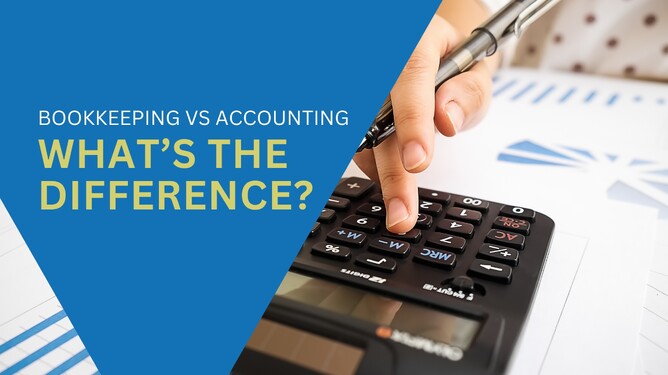In the world of business, there’s often the misconception that accountants and bookkeepers are the same thing. But while many accounting and bookkeeping job responsibilities overlap and both can provide financial advice, there are key differences between the roles.
Traditionally, a bookkeeper handles the day-to-day financial transactions of your business (like recording financial payments and processing payroll), while an accountant looks at the bigger picture and provides strategic advice.
In this article, I’ll discuss the differences between accounting and bookkeeping, so you can decide if you should hire a bookkeeper or an accountant. In this article, I’ll discuss:
What is bookkeeping?
The role of the accountant
The key differences between bookkeeping and accounting
The key tasks of a bookkeeper vs an accountant
How to decide which is best for your business
More and more, I am getting asked to perform accounting services, such as GST and tax returns, profitability advice, and financial analysis. If, after reading this article, you’re still not sure what service is right for your business, and you don’t want to pay those big accountant fees, then get in touch. I’ll let you know if I’m the right fit for you!
What is Bookkeeping?
Typically, the bookkeeper is responsible for the day-to-day financial transactions of your business. Bookkeepers are often responsible for keeping accurate records and ensuring financial data is up-to-date. The most common tasks for a bookkeeper include:
Recording payments and transactions
Maintaining balanced ledgers
Processing staff payroll
Customer invoicing and recording payments
Conducting monthly bank reconciliations
Preparing financial reports
Providing year-end financials and tax documents for the accountant
Keeping track of cash flow, expenses, and revenue
Monitoring budgets
Use of accounting software
Income tax and GST
Accurate bookkeeping is essential for any business. It ensures compliance with local tax regulations and provides valuable insight into a business’s financial health. Bookkeeping helps businesses make informed decisions and identify areas for improvement.
The Role of Accounting
While bookkeeping focuses on the accurate recording of financial information, accountants take a broader view of your finances. Accountants use the data compiled by bookkeepers to prepare comprehensive financial statements to provide strategic financial advice. Accountants can perform:
Business audits
Analyse financial data
Assess the profitability of a business
Identify financial trends
Provide a future forecast
Compliance with tax laws and regulations
Help organisations make informed financial decisions to achieve their goals.
Accountants play a crucial role in ensuring your business stays compliant, and your accountant is your big-picture financial expert.
How To Decide What’s Best For Your Business
Accountants can handle bookkeeping tasks. But a key difference is cost and services. While a bookkeeper may be the more affordable of the two, accountants often deal with more complex financial situations, such as auditing and strategic business advice.
A main difference is that most accountants hold a bachelor’s degree in accounting, finance, or commerce, whereas bookkeepers don’t need to have a degree. Most bookkeepers hold a qualification through a professional bookkeeping association. To decide what’s best for you, ask yourself the following questions.
#1. Are you an SME business and just need help with your financial transactions?
If you’re a small-to-medium-sized (SME) business, freelancer or sole trader with straightforward financial transactions who needs help keeping up with payroll, Provisional Tax, GST, and tax regulations, then a bookkeeper is likely the best choice for you and your business. By hiring a bookkeeper, you can mitigate the risk of errors in your financial records and avoid potential penalties for non-compliance.
#2. Do you find managing your financial records time-consuming?
Hire a bookkeeper. Managing financial records can be time-consuming, especially for business owners who already have numerous responsibilities. Hiring a bookkeeper allows you to delegate this task, freeing up valuable time to focus on core business activities or personal pursuits.
#3. Are you taking on new staff? Or is your payroll becoming more complex?
Managing payroll can quickly become complex as your team grows. Missing monthly filings or making errors with PAYE can result in penalties and unnecessary stress, but by working with a bookkeeper, you can reduce the risk, save time, and gain confidence that your staff are paid correctly and your business stays fully compliant.
#4. Do you want to understand how your business is performing?
Bookkeepers or accountants can provide valuable insights into the financial health of a business by generating reports and analysing financial data. By interpreting trends and identifying areas for improvement, they can help you make informed decisions about your business to optimise your operations and achieve your goals.
#5. Are you having trouble keeping up with GST, Provisional, and income tax?
Bookkeepers play a crucial role in preparing financial records for tax purposes, ensuring all your income, expenses, and deductions are accurately documented. This streamlines your tax filing process and minimises the risk of errors, potentially leading to tax savings or refunds.
#6. Do you want to streamline your financials?
As your business grows, so do your financial complexities. Hiring a bookkeeper can ensure that your financial records are properly managed and organised, laying the groundwork for future growth.
#7. Are you on a tighter budget?
Bookkeeper services often come at a lower cost compared to accountants because of the differences in the role, responsibilities, and qualifications. Bookkeepers primarily focus on financial tasks and details, whereas accountants often undergo extensive education, therefore, may command higher fees. Businesses seeking basic financial management and record-keeping may find it more cost-effective to hire a bookkeeper.
#7. Is your business experiencing rapid growth, or are your financial transactions complex?
If your business or trust is audited regularly, experiencing rapid growth, or requires a more advanced financial analysis, strategic planning, tax expertise, and regulatory compliance, you are likely a good fit for an accountant.
Accountants and bookkeepers do work closely together, especially in larger organisations where financial responsibility is more complex. Bookkeepers prepare the groundwork, leaving the accountant to analyse the financial health of an organisation and provide strategic recommendations.
Too small for a full-time accountant? Struggling to keep on top of your bookwork? Want to know how your business is performing regularly? Get in contact with me to discuss your tax and bookkeeping needs.


